William Han: IMO 2017 Brazil Report
Background
I was privileged to be selected as part of the six person team that represented New Zealand at the 58th International Mathematical Olympiad (IMO) that was held in Rio de Janeiro, Brazil in July 2017. The IMO is the premier mathematics competition for secondary school students around the world. This year, 623 students out of delegations from 112 countries attended this competition, the oldest and most prestigious of the Science Olympiads.
The IMO is an annual event held in a different country each year in July. The competition itself is over two consecutive days, with four-and-a-half hours to answer three challenging problems per day. Each day consists of an easy, medium and hard problem, with Problems 1 and 4 being the easy problems, Problems 2 and 5 being the medium problems, and Problems 3 and 6 being the hard problems. This classification is by relative difficulty, in reality all six problems are very challenging and only half of the contestants each year manage to solve the two easy problems or more. The problems chosen are from various areas of secondary school mathematics, broadly classifiable as geometry, number theory, algebra, and combinatorics. They require no knowledge of higher mathematics such as calculus and analysis. No calculators are allowed.
Each country may send up to six contestants, who compete individually. Each problem is marked out of 7 points, so the maximum total score for each contestant is 42 points, and the maximum total score for each team per question is also 42 points. Medals are awarded to the highest ranked participants, with slightly fewer than half receiving a medal. The cutoffs, which are the minimum scores required to receive a gold, silver or bronze medal respectively, are then chosen so that the numbers of gold, silver and bronze medals awarded are approximately in the ratio 1:2:3. Participants who do not win a medal but who score seven points on at least one problem receive an honorable mention.
The marks of each competitor are agreed upon in a process called coordination, which happens in the days immediately after the competition. The leader and deputy leader from each country meet with coordinators provided by the host country. Coordination is a blend of discussion regarding the merits and flaws of the solutions of each contestant, and argument as the leader and deputy leader attempt to convince the coordinators to agree on extra marks for the contestants of their country.
This year, the New Zealand IMO team was comprised of Andrew Chen (Saint Kentigern College, Auckland), Yiannis Fam (Wellington College, Wellington), William Han (Macleans College, Auckland), Keiran Lewellen (Te Kura, Wellington), Stacey Tian (St Cuthbert’s College, Auckland) and Tony Wang (Auckland International College, Auckland). Accompanying the team was team leader Michael Albert (University of Otago, Dunedin), deputy team leader Robin Hankin (Auckland University of Technology, Auckland) and team manager Phil Truesdale (Papanui High School, Christchurch).
Report
Although our journey to Brazil for the IMO only started on the evening of the 14th July 2017, my personal journey started more than a year prior, in April 2016. The team for the 2016 IMO had just been announced and a primary school friend of mine, Andrew Chen, had managed to make the team. Because of this, I decided to begin doing Maths Olympiad. From when I was very little, maths had always been very easy, and so it came as an unpleasant surprise for me that I had no idea how to even attempt the easiest Maths Olympiad questions. This was the first time I had ever faced difficulty in doing maths, and it is difficult to put into words what it felt like. The easiest thing to do would have been to quit, continuing to do school maths that was way too easy. But I am only here today, having just returned from representing my country at the IMO, because I persevered through those tough times, and eventually overcame them after devoting time and effort.
In January 2017, I was one of 24 students selected to attend the NZMOC Training Camp. At the camp, after taking a test, I was selected for the Training Squad of 12 students that would continue further training. From January to March 2017, the squad sat three further tests, and these results were used to select the final team of six for the 2017 IMO. My selection to the team was a surprise for me, coming just one year after my troubled start. All throughout the selection process, I was facing people with many years more experience than me, and I believe my eventual selection is a testament to my dedication and perseverance over the last year. As the only Year 11, I am also the youngest member of the team.

NZ IMO Team ready for departure in Auckland.
After a week of pre-departure training in Auckland, and four mock IMO tests, the actual journey to the IMO began when we boarded flight NZ30 to Buenos Aires that departed late in the evening of 14th July 2017 from Auckland. From there, a connecting flight took us to Rio de Janeiro, where we arrived late at night on the 14th July, due to differences in time zones. Our team headed immediately to the Sheraton Barra hotel, where we found a shortage of beds in each room. After extra beds had been hurriedly put in, we found out that the water stopped working after midnight, depriving me of the opportunity for a shower. Exhausted, and without energy to complain, everyone went to bed immediately.
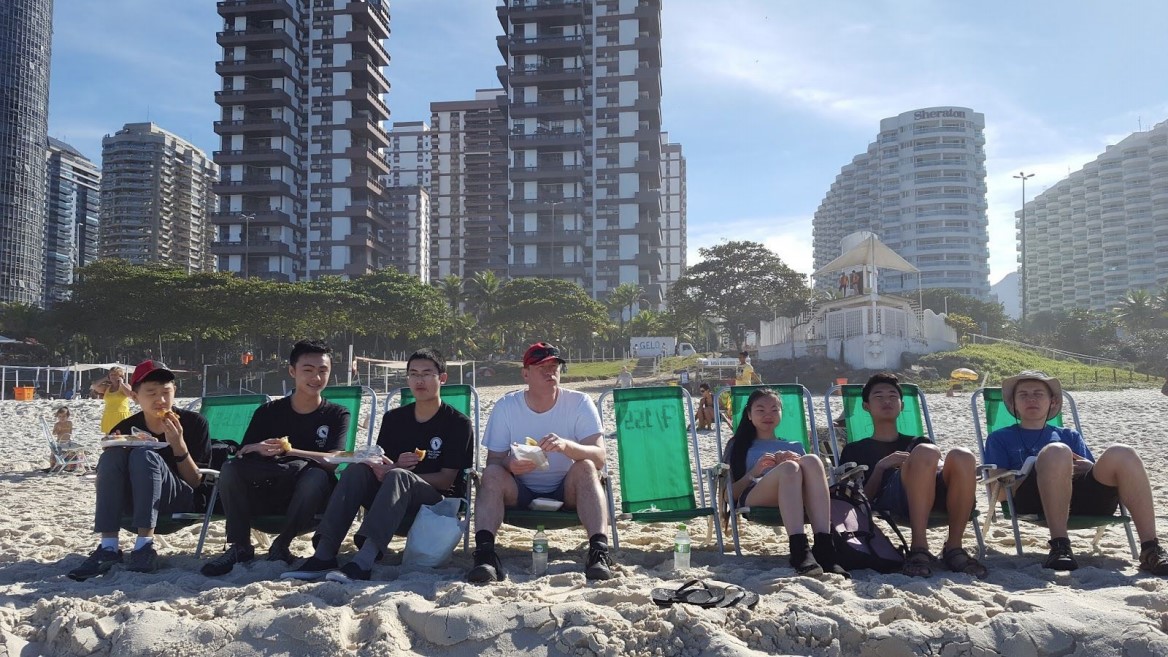
Our first morning in Rio spent on the beach.
After a few hours of fitful sleep in a room that was freezing due to the fierce air conditioning, my roommates and I woke at 6am, a waking time that we would have for the whole trip. In order to speed up acclimatisation to the local time, we spent the morning outside at Barra beach, across the road from the hotel, and had breakfast from a local bakery. The temperature was warm and it was sunny, a very nice change from the cold and the rain back in Auckland. The afternoon was used for a last-minute training session. That evening, we all made sure to take a shower well before midnight and double-checked that the air conditioning was off before heading to bed.
The 16th July was the day when we were scheduled to move into the official IMO accommodation. From this day onwards, all meals, accommodation and other expenses were provided for by the IMO organisers. Our move involved checking out of the Sheraton Barra at midday and walking a few hundred metres down the beach to check into the Windsor Oceanico hotel. That day was our first opportunity to interact with other teams from all over the world, and that evening we had our first of many delicious buffet meals in the splendid hotel dining area. It was also our first opportunity to meet our local guide, Leticia. Upon heading up to the 15th floor to our rooms, we also found out that the rooms were much nicer and that the water did not turn off late at night.
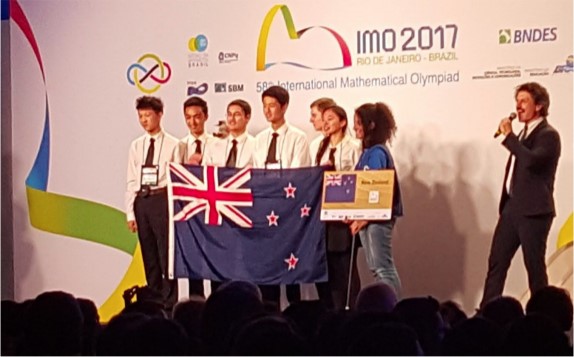
NZ IMO Team at the opening ceremony.
After a delicious breakfast and lunch, the opening ceremony took place on the afternoon of the 17th July, welcoming everyone to Rio de Janeiro for the 58th IMO. All the competitors were paraded across stage to the sound of Carnival music. However the thought that the two days of tests were the 18th and 19th July, just a day away, prevented me from fully enjoying myself there. That evening, after organising our equipment in preparation for IMO Day 1, we headed to bed at the very early time of 9pm.
On the morning of IMO Day 1, after waking at the usual time of 6am, we headed down to breakfast with a mixture of anxiety and anticipation. Since everyone was trying to use the elevators at the same time, they stopped at every floor, making each journey up and down take an excruciating amount of time. That morning, I was trapped in an elevator alone for several minutes, which unsettled me greatly. When I was going up to the 15th floor to collect my equipment, the elevator unexplainably refused to open when it arrived at my floor. Instead, it shot down to the lowest floor again, and remained there, refusing to respond to the buttons I pressed. After sounding the alarm for a few minutes, it eventually opened again, to my great relief. For the rest of the IMO, I never set foot in that particular elevator again. Fortunately, we had left enough time beforehand so that even with the delays, we were all able to make it into the test venue, which was a very large hall within the hotel, on time for the 9am start. During the exam, I managed to solve and write my solution to Problem 1, a number theory problem involving sequences, within the first hour. For the rest of the time, I attempted Problem 2, an algebra problem involving a functional equation, making some significant progress but not managing to find the crucial step that solved the problem. After the test finished, we went to have lunch, and there I found out that everyone else in the team had fared similarly, with everyone solving Problem 1, with various amounts of progress on Problem 2. That evening, we all went to bed at 9pm again in preparation for IMO Day 2.
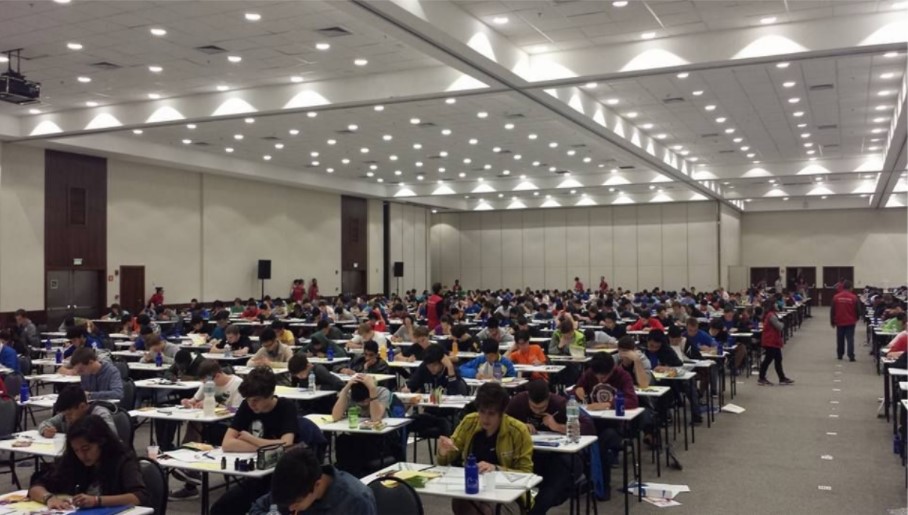
The test hall during the first day of the competition.
The morning of IMO Day 2 went similarly to the morning of IMO Day 1, with everyone meeting for breakfast and then heading to the test venue. This time, since I avoided the malfunctioning elevator, the morning had no unpleasant surprises and we entered the test venue with plenty of time to spare before the 9am start. The first problem of that day, Problem 4, was a classical Euclidian geometry problem, and I attempted it first. Unlike Problem 1 the day before, I was not able to find a solution to it quickly. The time ticked away, and my attempts to solve the problem, which kept failing, became increasingly urgent and panicked. Finally, after 2.5 hours, I realised that I had overlooked something obvious and that the solution was staring me in the face. Within a few minutes, I had written my solution to Problem 4, and the feeling of panic had disappeared. For the remainder of the time, I tried Problem 5, a combinatorics question, but made no substantial progress. After the test ended, at lunchtime I found out again that the rest of the team had fared similarly, with everyone solving Problem 4 and no one making much progress on the other problems. That afternoon, as we were out at a shopping mall, it finally hit me that the 2017 IMO was over.
For the rest of our time in Rio de Janeiro, we visited tourist attractions and had fun with the other contestants from all over the world. So the day after the IMO, the 20th July, the six team members, along with our manager Phil and guide Leticia went to the Sugarloaf Mountain while Michael and Robin, our leader and deputy leader, went to coordination with our papers, preparing to fight for extra marks. We spent half a day there admiring the beautiful view at the top, and then headed back to the hotel. While we were at the Sugarloaf Mountain, Phil informed us that he had received a text from Michael saying that he and the coordinators had been unable to agree on the scores to Problem 1, and they had scheduled another meeting that evening. The coordinators had insisted on deducting marks while Michael would not settle for less than perfect 7s for the whole team. That evening just before dinner, we were informed by Phil that Michael and Robin had successfully gotten a perfect 42 points for both Problem 1 and Problem 4, after Michael had managed to convince the coordinators for Problem 1 at their second meeting. This was also the first time in New Zealand’s history that we had gotten perfect scores to two problems, and it was a huge relief hearing that I had gotten 7 points for both Problem 1 and 4, especially after Michael’s text earlier made me worry about deductions.
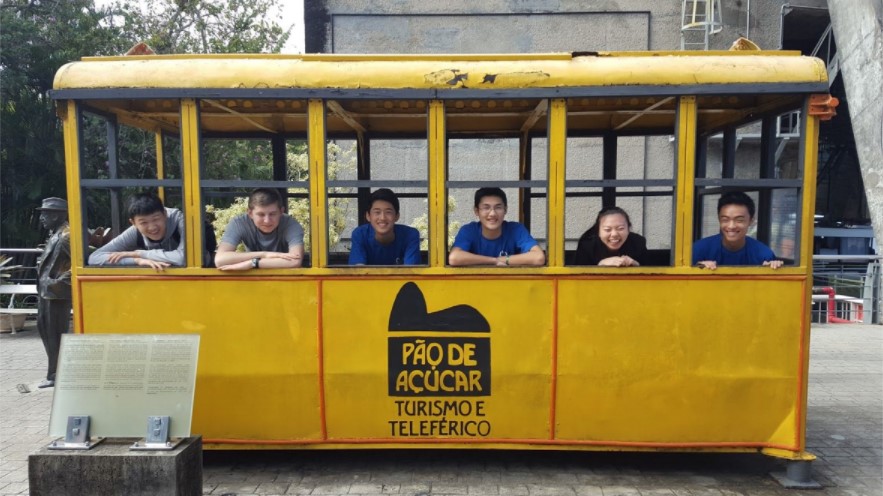
NZ IMO Team at the Sugarloaf Mountain.
The 21st July was the designated day for the IMO excursion, a trip that the IMO organisers had organised for us. We went to the Rodrigo de Freitas Lagoon, the Olympic Boulevard and into the Maracana Stadium. The excursion lasted for the whole morning, and while we were on it, Phil received a text from Michael saying that coordination had finished, and our scores were finalised. It emerged that I had received 3 points for my progress on Problem 2, putting my final score at 17 points. That evening, most of the contestants crowded in the recreation room as the medal cutoffs and full results were due to be released online. At around 9:30pm, the results went online. There was an immediate reaction in the room as the results were released, a mixture of happiness and disappointment as people found out their scores and the medal cutoffs. The medal cutoffs were 16 points for Bronze, 19 points for Silver and 25 points for Gold. This meant that I had managed to obtain a Bronze medal, putting myself in the top half of this very prestigious competition. I felt a bittersweet feeling as I had managed to get a medal, a significant achievement in this gathering of the best young mathematicians, yet I had missed out on getting a Silver medal by just 2 points. New Zealand achieved its third best result ever, with three Bronze medals: Yiannis Fam, Andrew Chen and myself, and three Honourable Mentions: Stacey Tian, Keiran Lewellen and Tony Wang.
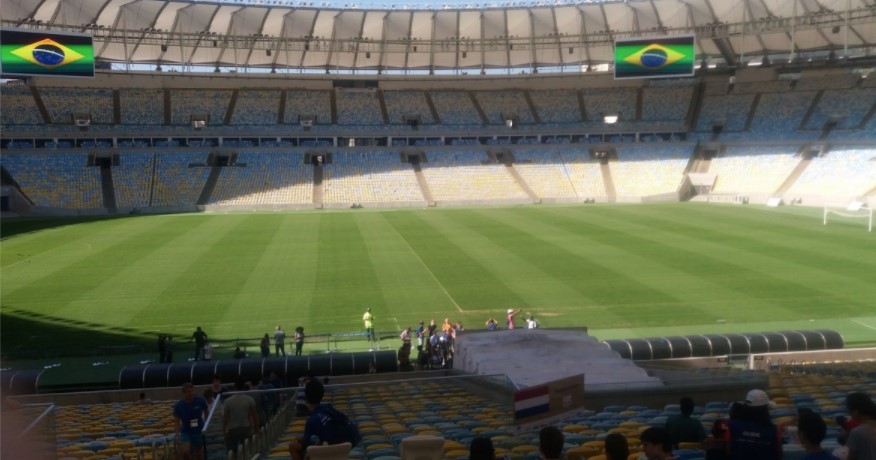
The view inside the famous Maracana Stadium.
The next morning, we woke early in order to make the long trip to the Christ the Redeemer statue. We spent the morning there, enjoying the wonderful view over the city of Rio de Janeiro and taking pictures of the statue itself. We returned to the hotel just in time for lunch, since the closing ceremony, including the medal presentation, was due to happen that afternoon. The closing ceremony was also accompanied by Carnival music, and I received my Bronze medal there, along with all the other medallists. This time, without an IMO test the following day, I was able to enjoy myself fully. Immediately following the closing ceremony was the IMO Dinner, a magnificent dinner prepared for everyone attending, a total of over a thousand people. The food was delicious and a band playing local music accompanied the dinner, creating an enjoyable and celebratory atmosphere.
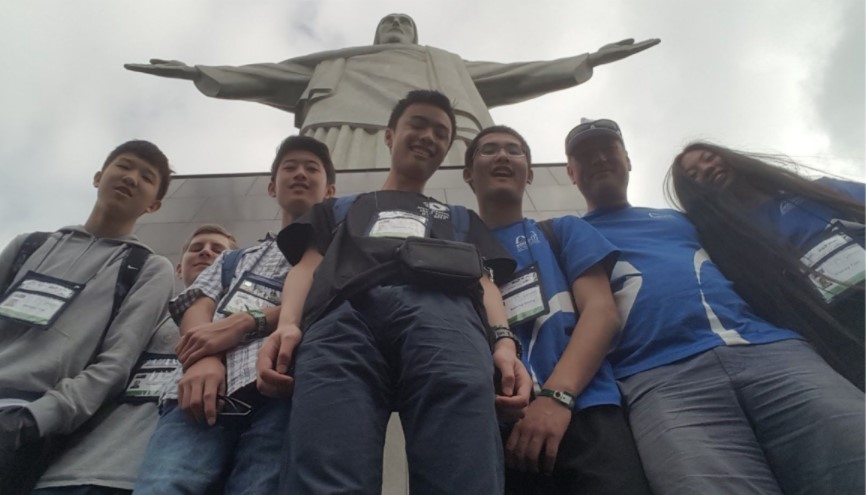
NZ IMO Team beneath the Christ the Redeemer statue.
The next day, the 23rd July, we woke at 5am, in order to go to the airport for our flight to Buenos Aires. Upon landing there, we waited for 11 hours for the flight back home to Auckland. Finally, completely exhausted and struggling not to fall asleep, we boarded flight NZ31 at 1am on the 24th July. After 12 hours onboard, most of which I spent asleep, we finally arrived back home in Auckland at 4am on the 25th July, tired but happy after our adventure in Brazil.
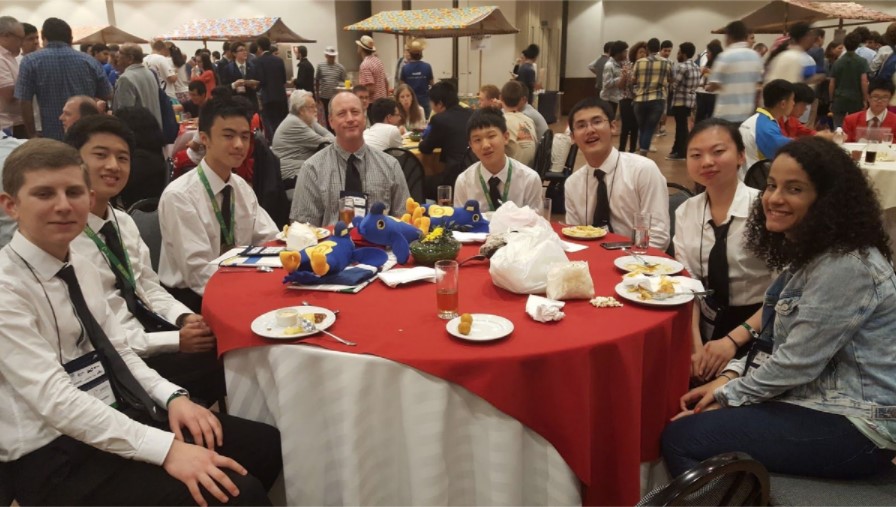
NZ IMO Team at the IMO Dinner.
Summary
This opportunity to attend this prestigious event means a lot to me. I have had the opportunity to meet and interact with like-minded students who enjoy doing maths as much as I do. Being able to connect with these people over our shared passion was a truly profound experience, one that cannot be replicated here in New Zealand. This trip has also allowed me to experience being in an environment that challenged me intellectually and encouraged me in the pursuit of knowledge, in sharp contrast to my daily life at school. Also, this trip has really influenced me to consider the possibility of pursuing mathematics as a career path. Definitely, after meeting so many talented mathematicians, I believe the future of mathematics looks very promising.
From my whole experience of doing Maths Olympiad, I have really learnt the value of perseverance. Each problem can require many hours of perseverance to solve, and on a larger scale it was only because I persevered through the tough times that I am here today. Through this experience, I have discovered my own capacity to persevere, to continue when the easiest thing to do is to quit.
And finally, the IMO experience was also a highly enjoyable experience. From getting to play games with people from all over the world, to acting as a tourist and getting to see famous attractions, to being able to experience life in a place as exotic as Brazil, and to sample the local cuisine, this IMO has truly been a memorable experience for me.
In twelve months time, the 2018 IMO will be held in Cluj-Napoca, Romania, and I can’t wait for it!
Acknowledgements
I would like to express my appreciation to the organisers and to all the staff involved with the 2017 IMO, for your dedication and hard work in making this event such a success. A special thanks to our guide Leticia, your help and cheerful presence throughout our time at the IMO was truly invaluable.
Thanks to the Royal Society and to the Howick RSA for your funding of this trip. It is only because of your generous support that I could travel to the IMO.
I would also like to thank all the training staff and instructors involved with the Training Camp, for your guidance during my time there.
I would like to express my gratitude to Michael and Robin, our leader and deputy leader, for your contributions in our training and your excellent job in coordination. Your efforts in securing marks for us cannot be understated.
And finally, a massive thanks to Phil for accompanying us, and looking after us throughout our time in Brazil. Your dedication and support do not go unnoticed.
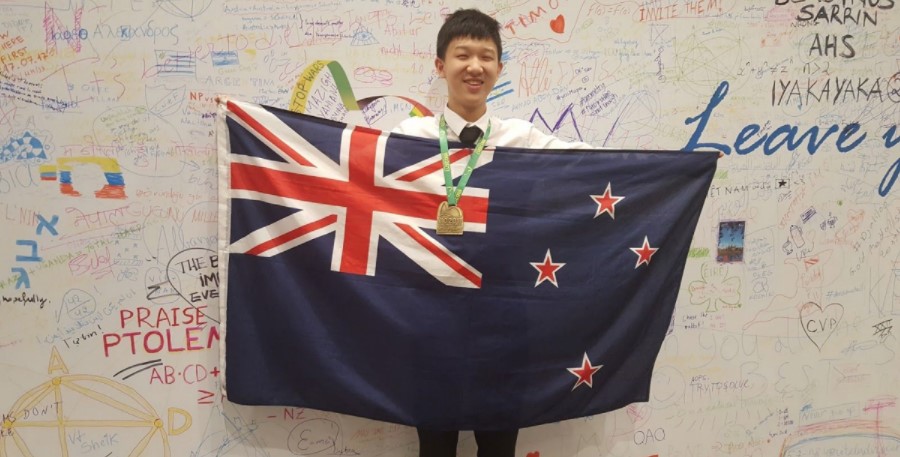
Me with my bronze medal.
Team Photos
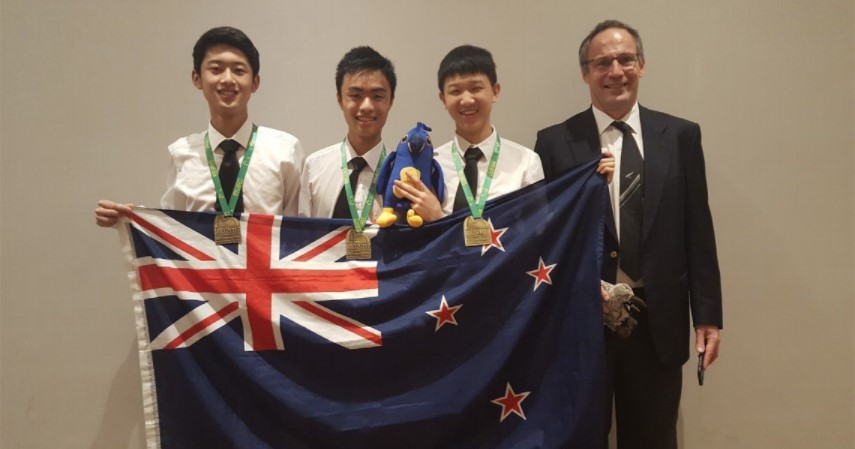
Medallists: Andrew Chen, Yiannis Fam, William Han and team leader Michael Albert.

2017 NZ IMO Team: manager Phil Truesdale, Stacey Tian, Tony Wang, William Han, leader Michael Albert, Andrew Chen, Yiannis Fam, Keiran Lewellen, deputy leader Robin Hankin.